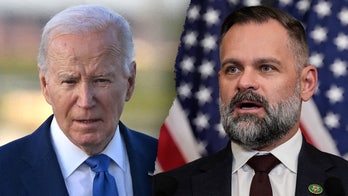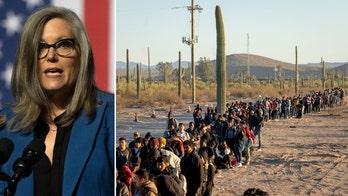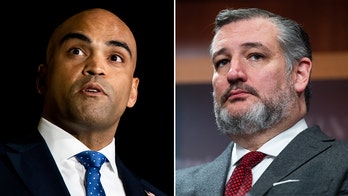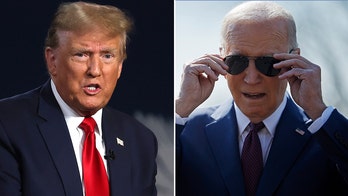
The Las Vegas strip at night. (Andrew O'Reilly/Fox News Latino)
LAS VEGAS – Sen. Harry Reid’s successful attempt to have Nevada moved in 2008 to one of the first states to vote in the primary elections centered on the fact that his constituency is growing and its diverse population is more in line with the overall American electorate than places like Iowa and New Hampshire.
Eight years later, and on the eve of the Democratic and Republican caucuses, Reid’s words appear to resonate more than ever.
As candidates on both sides of the political divide crisscross the Silver State, much of the talk from pundits and political observers in the run-up to the caucuses has focused on the emergent power of the Latino vote in Nevada.
“What you're going to see Saturday is a much more diverse electorate than you saw in Iowa and New Hampshire,” David Damore, a political science professor at the University of Nevada-Las Vegas and a researcher for Latino Decisions, told Fox News Latino. “The campaigns and the candidates really have to engage these voters.”
Pew Research found that there are 328,000 Latinos eligible to vote in the caucus – or over 17 percent of the state’s total electorate – and 45 percent of them are in the coveted millennial age group between 18 and 30.
Winning over the Latino vote in Nevada has been a particular concern in the race for the Democratic nomination.
In the Democratic primary, former Secretary of State Hillary Clinton has pinned her hopes on winning Nevada thanks to a strong ground game built around a coalition of Latinos and African-Americans. Following a big win in the New Hampshire primary, however, her rival, Vermont Sen. Bernie Sanders, has cut into her support among Latinos, especially younger Hispanics – putting the two Democrats in a dead heat race and having analysts projecting a heavy attendance at Saturday’s caucus.
“I really do expect record participation because young people are opening doors, opening their arms they are trying to convince their next door neighbors, their parents, their brothers and sisters to participate in these caucuses,” Fernando Romero, the president of the Las Vegas-based, non-partisan group Hispanics in Politics, told FNL.
For candidates in both parties, voter turnout has become a major concern as the clock counts down to the caucuses – especially among Latinos. While Latino voter turnout was high in the 2012 presidential primaries and general elections, it fell off precipitously in the 2014 midterm elections, where less than half of the eligible voters showed up at the polls.
"In 2014, there was a lot of disenchantment among Latino voters because of the failure to pass comprehensive immigration reform," Damore said. "The big unknown in 2016 is going to be the size of the electorate. They could make up 20 percent of the electorate, but that assumes a very high turnout among Latinos at the polls."
While their anger over the lack of any major action toward comprehensive immigration reform kept Latinos at home during the mid-terms, political organizers – pushing the idea that going to caucus is their civic duty – say that there are other issues that could keep Latinos from coming to caucus sites, namely the caucus format itself.
“The caucus is very new to Nevada and people are unfamiliar with the process, especially in the Latino community,” Vanessa Valdiva, a field organizer for Hillary in America, told FNL. “You go to them ‘You going to vote for Hillary? Are you going to caucus and they’re like, ‘what’s a caucus?’”
Unlike Iowa, which has had a caucus format for four decades, Nevada only became a caucus state when it was moved up in the primary season in 2008. Many prospective caucus-voters in the state say they are unsure what goes on during the event or how to patriciate in it.
Much of the attention in Nevada has been focused on Democratic efforts to win Latino votes, but numbers suggest that the party doesn’t have the lock on the Hispanic vote that many would have people believe.
Romero, who heads the most influential Hispanic political group in the state, is Republican as is the state’s popular Latino governor, Brian Sandoval. Many of the state’s Latinos are independent.
“I always vote either or what is the best candidate,” Las Vegas restaurant worker Victor Chicas told Fox News’ Jonathan Hunt. “So I go Democrat, Republican or independent.”




